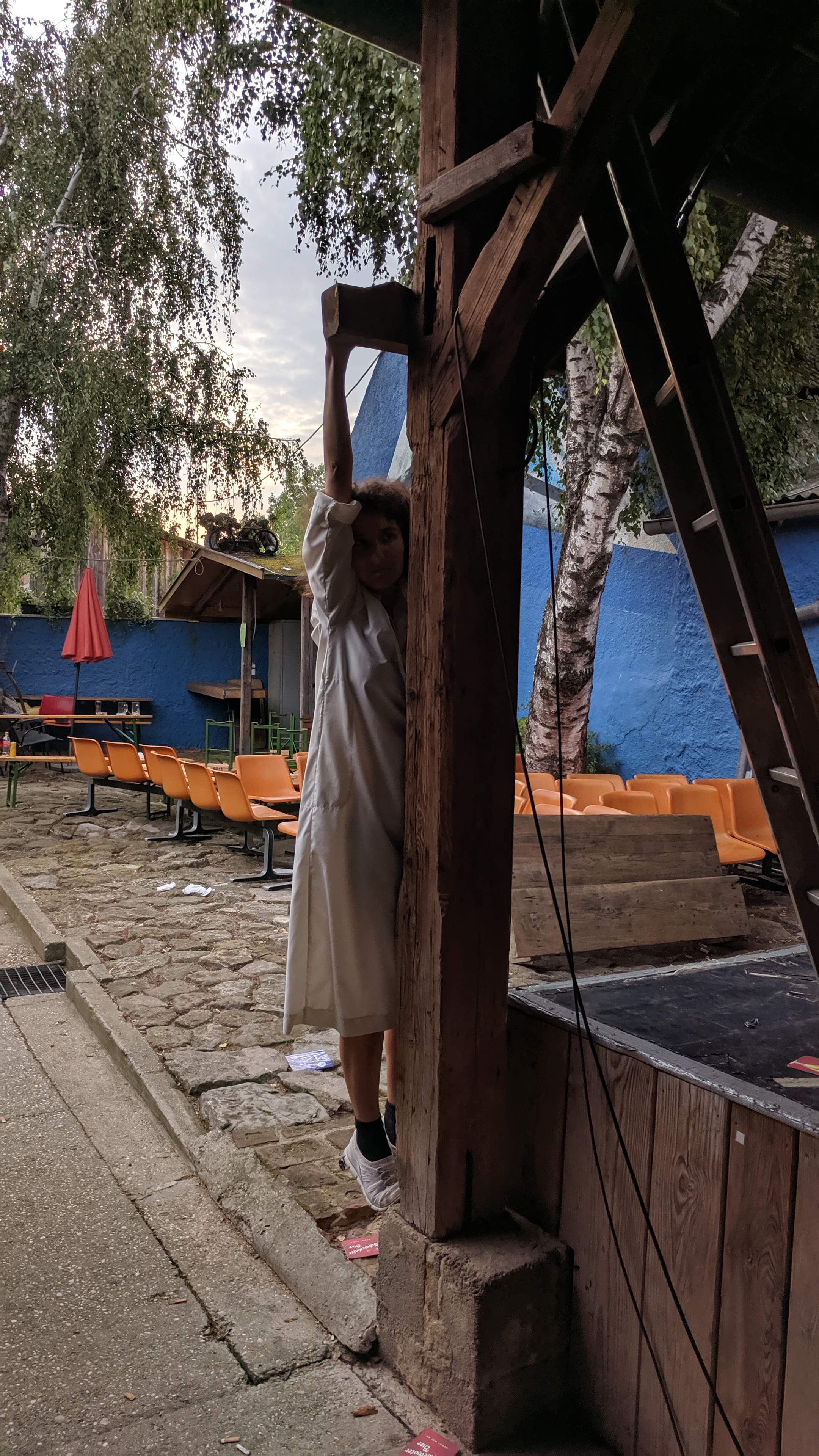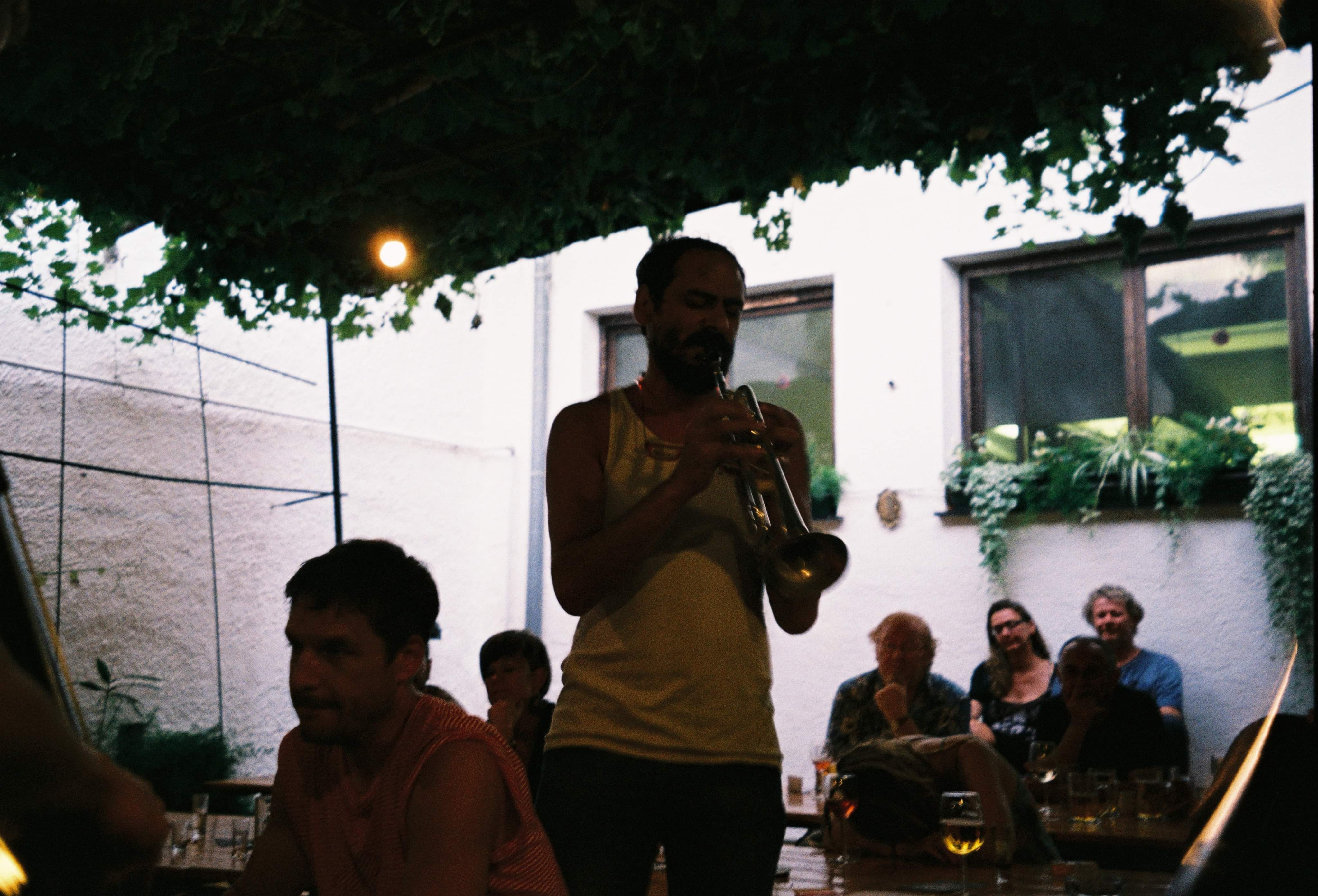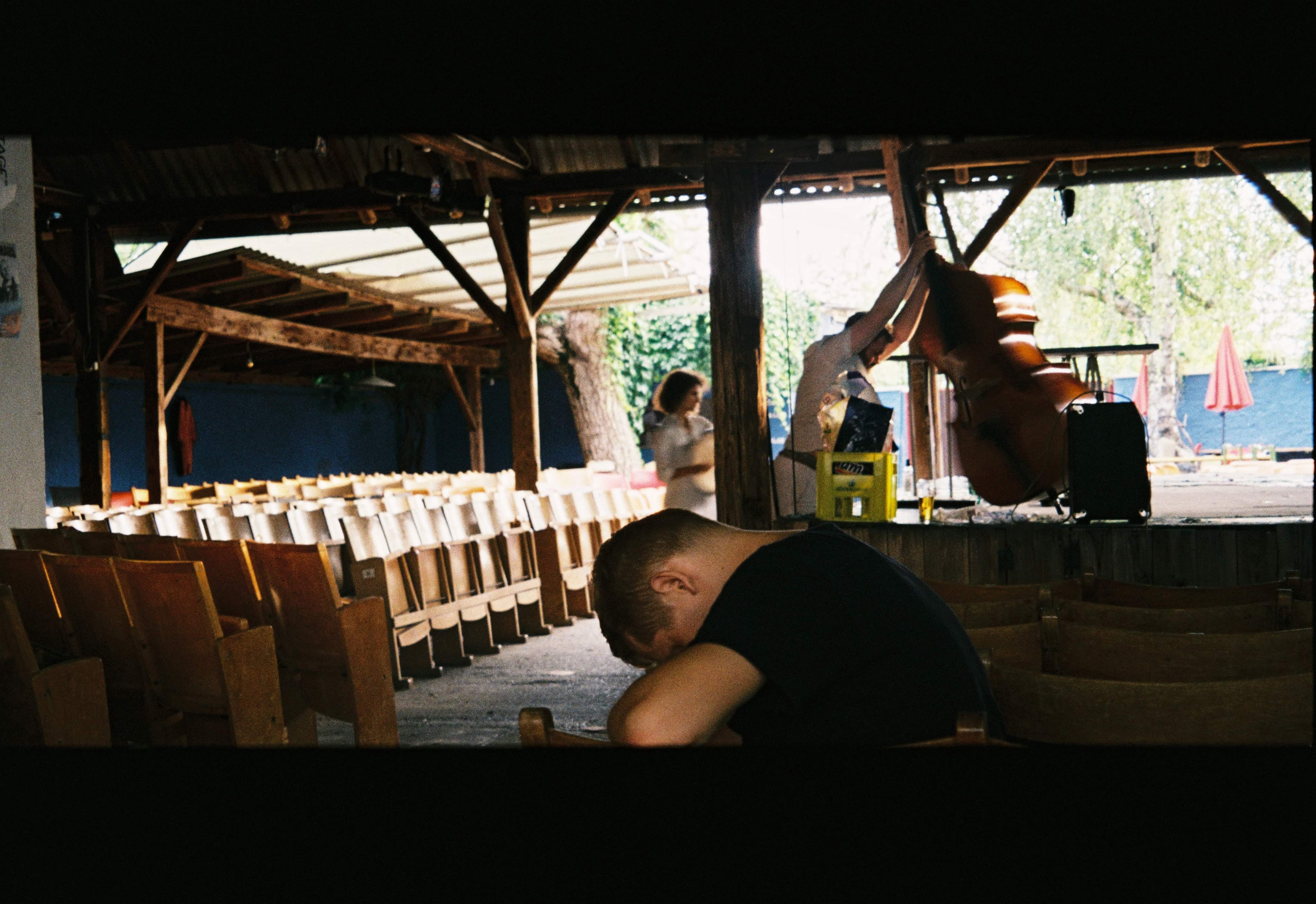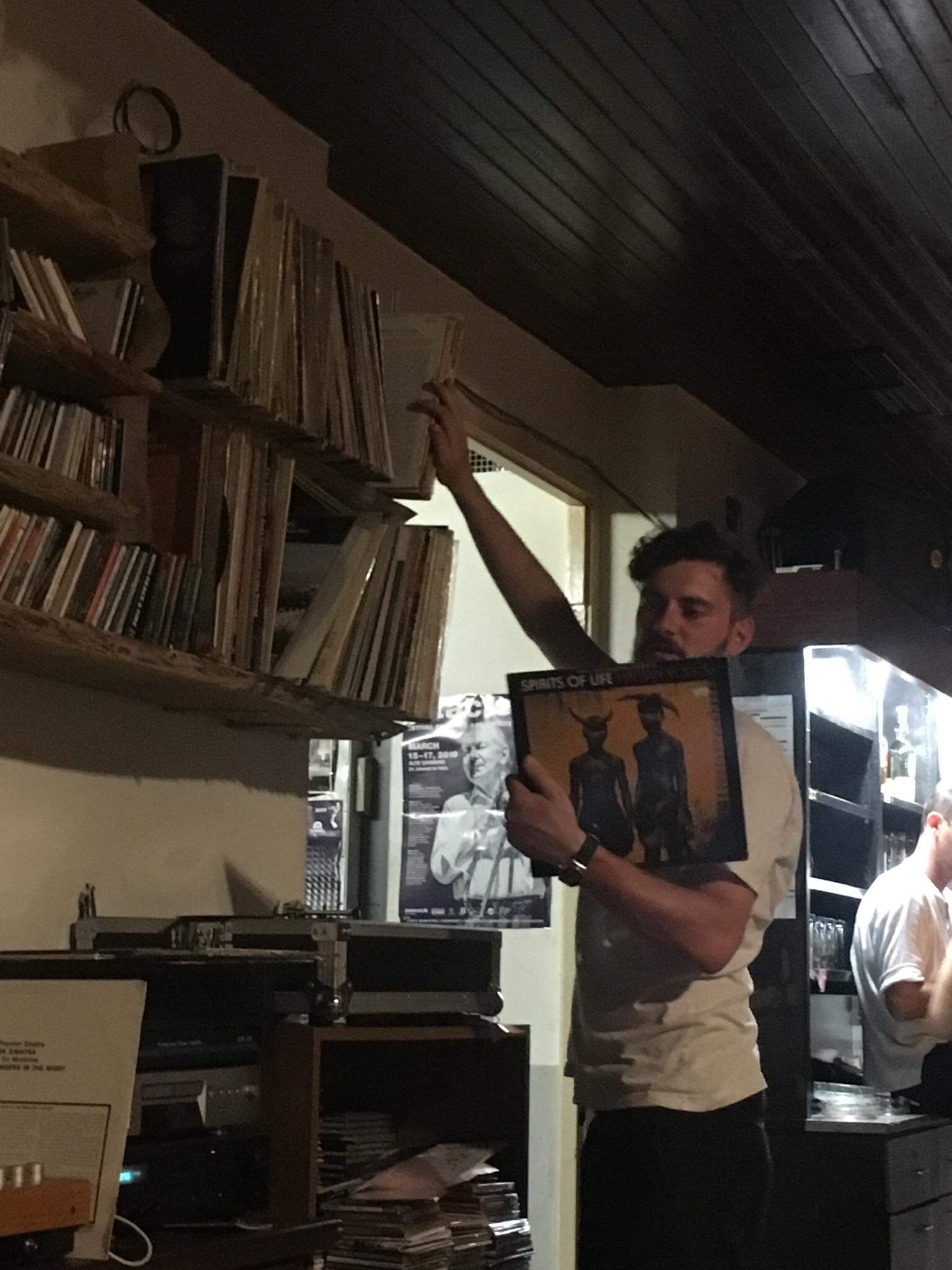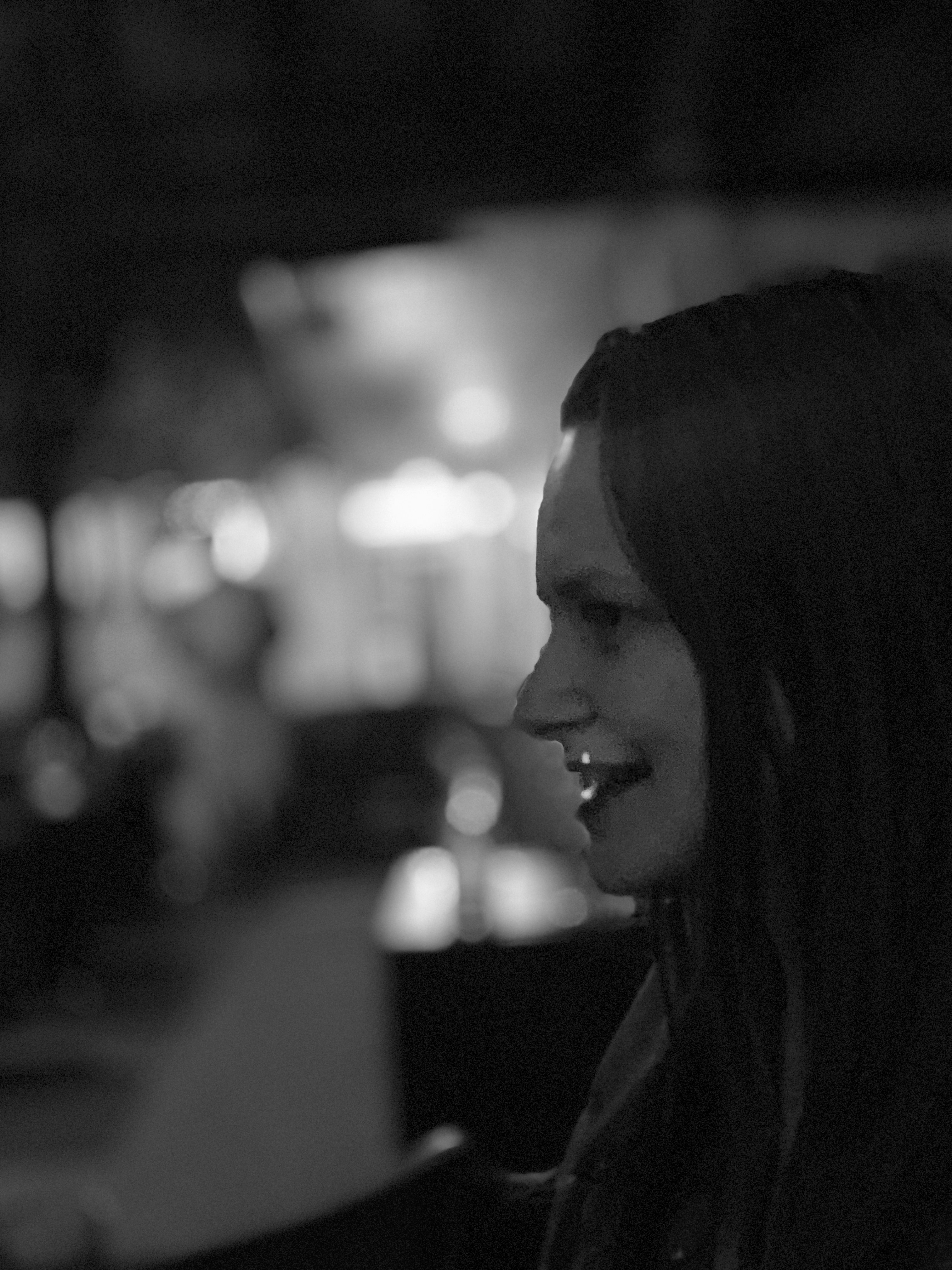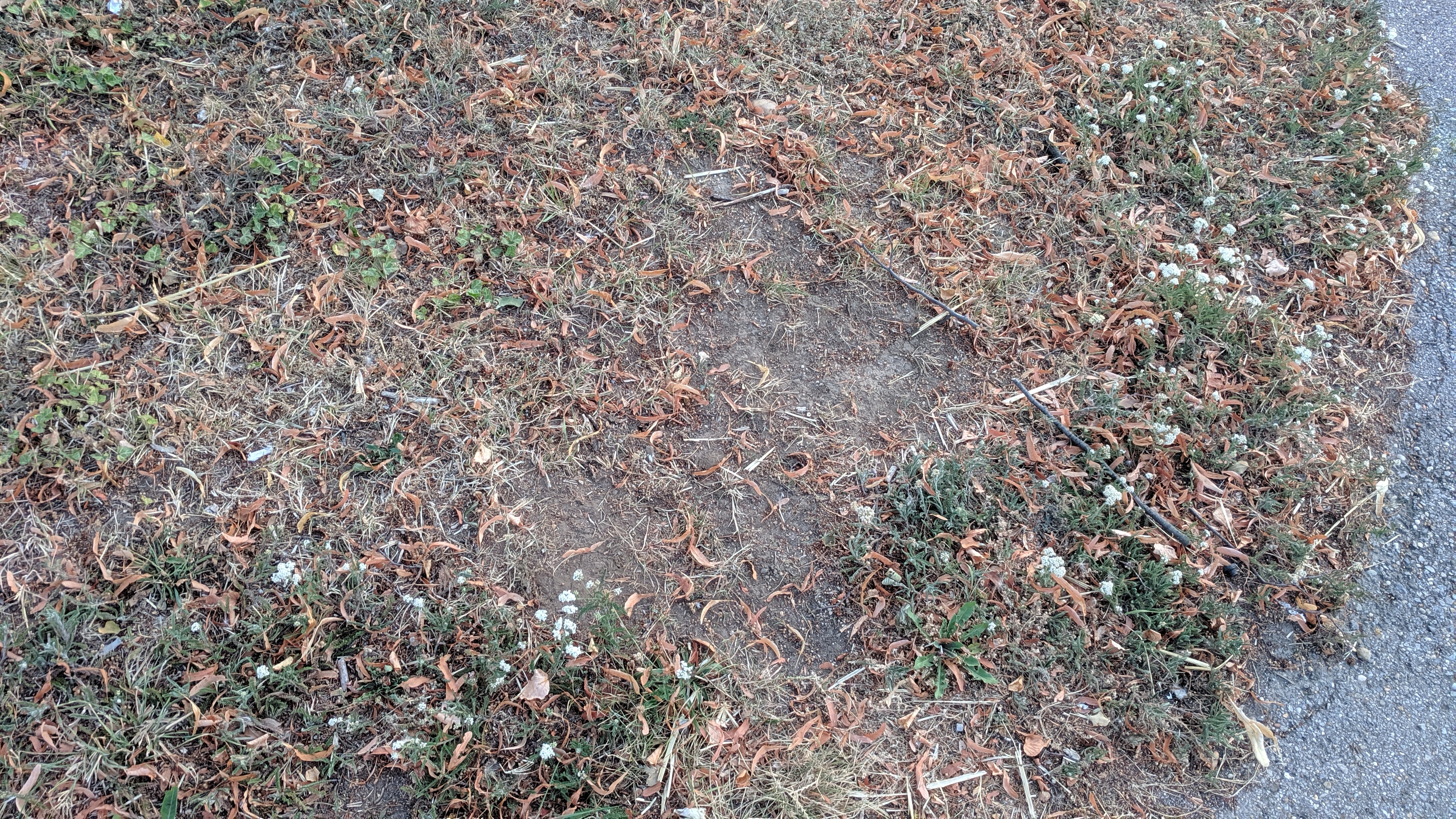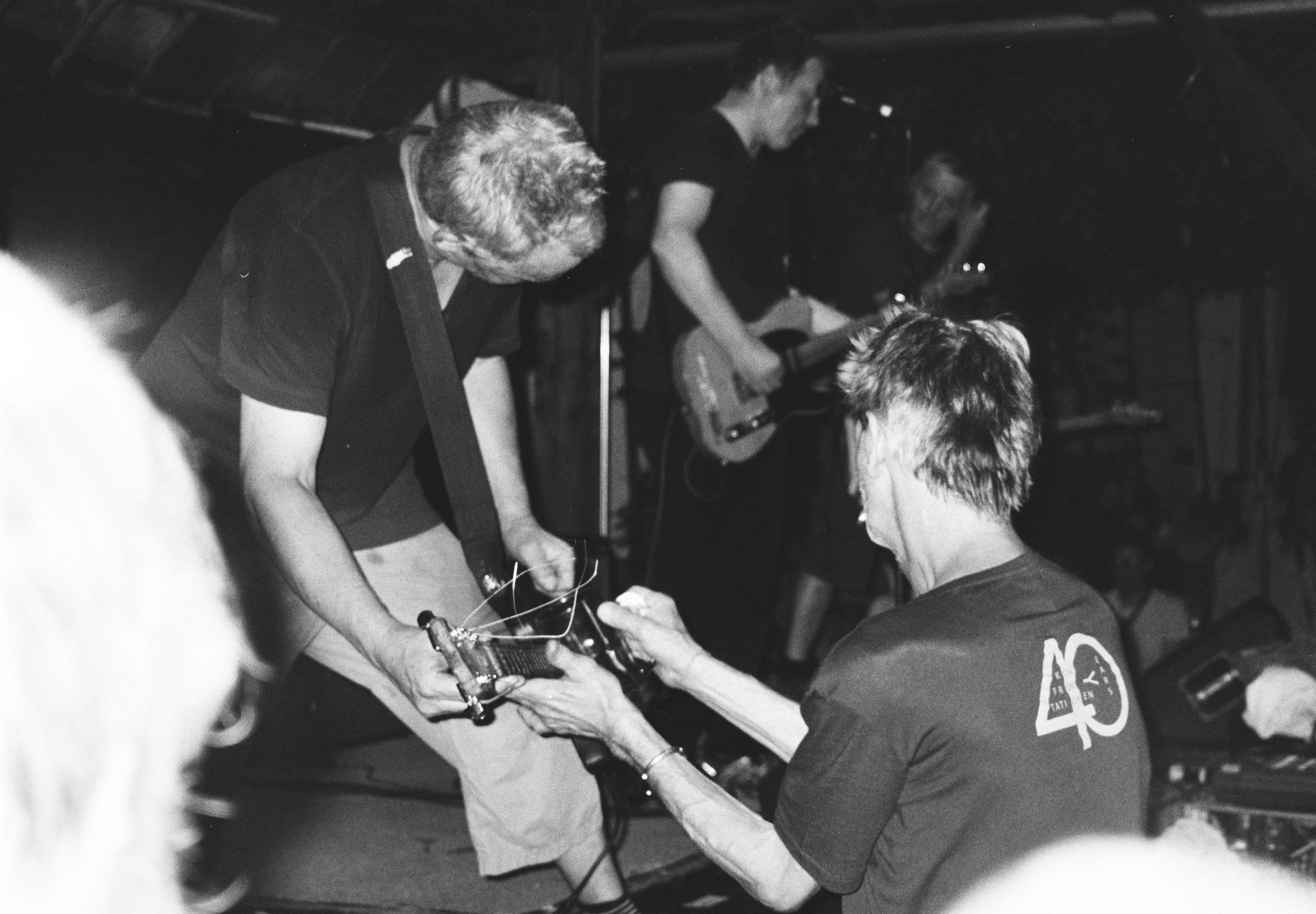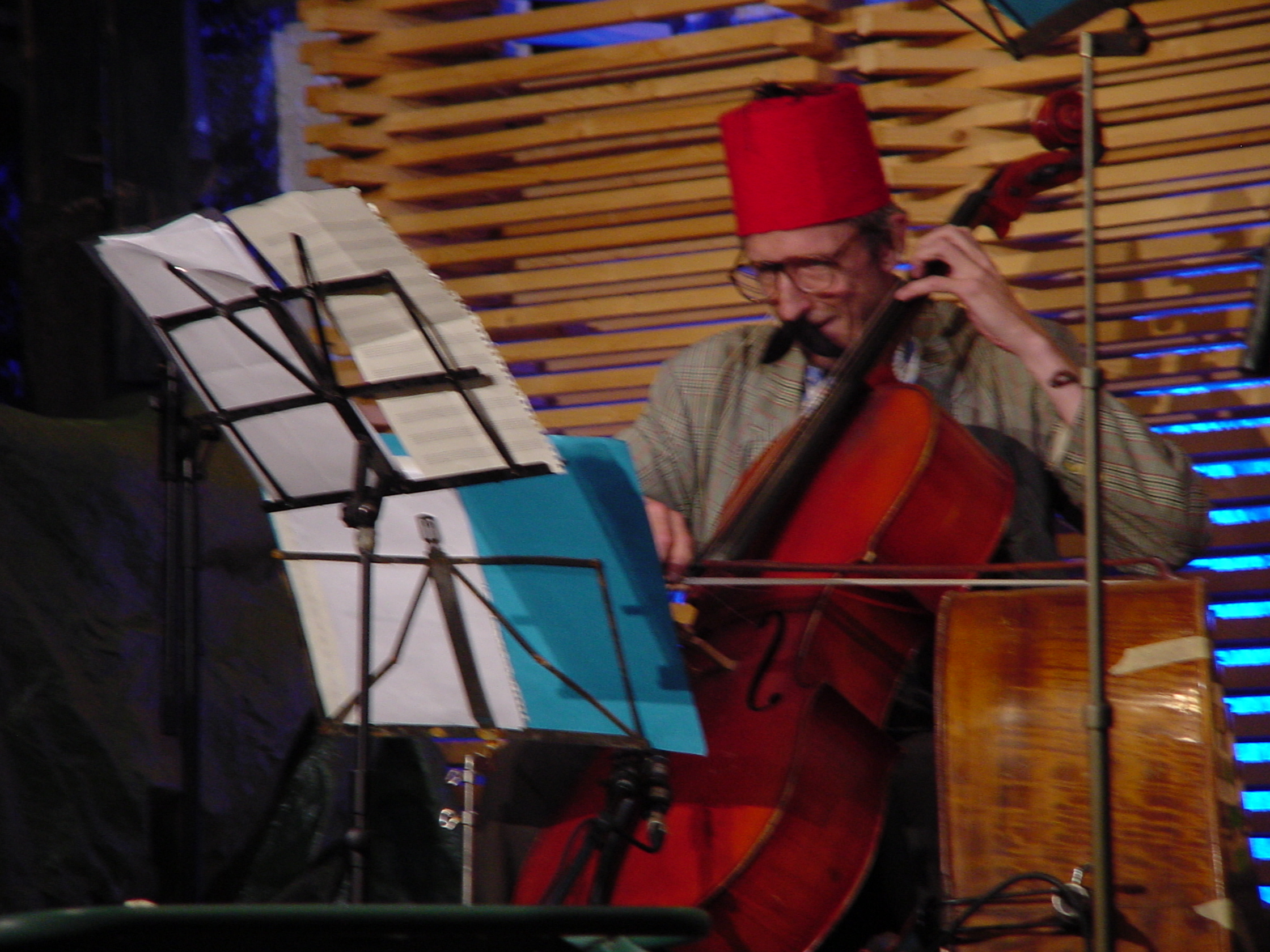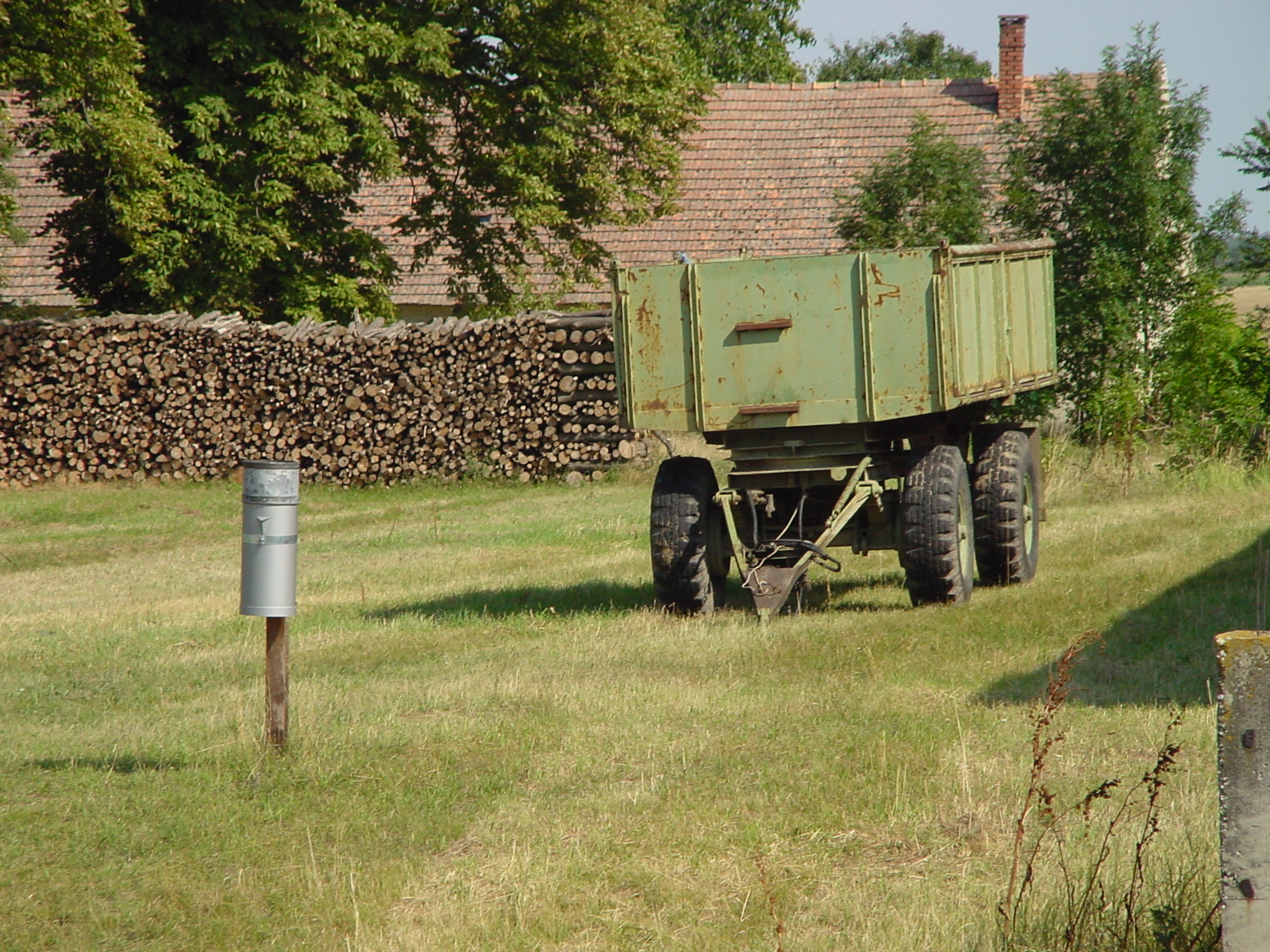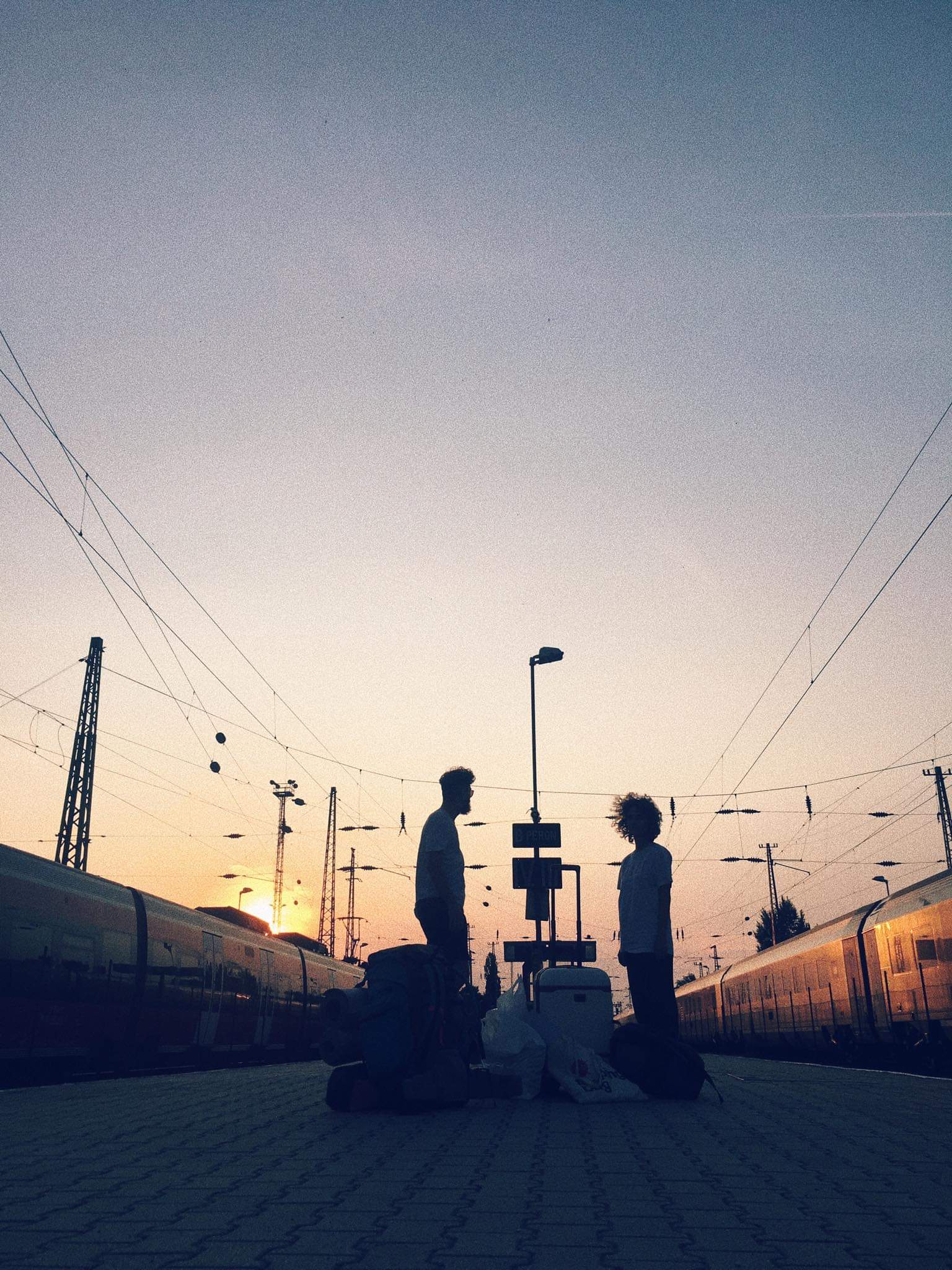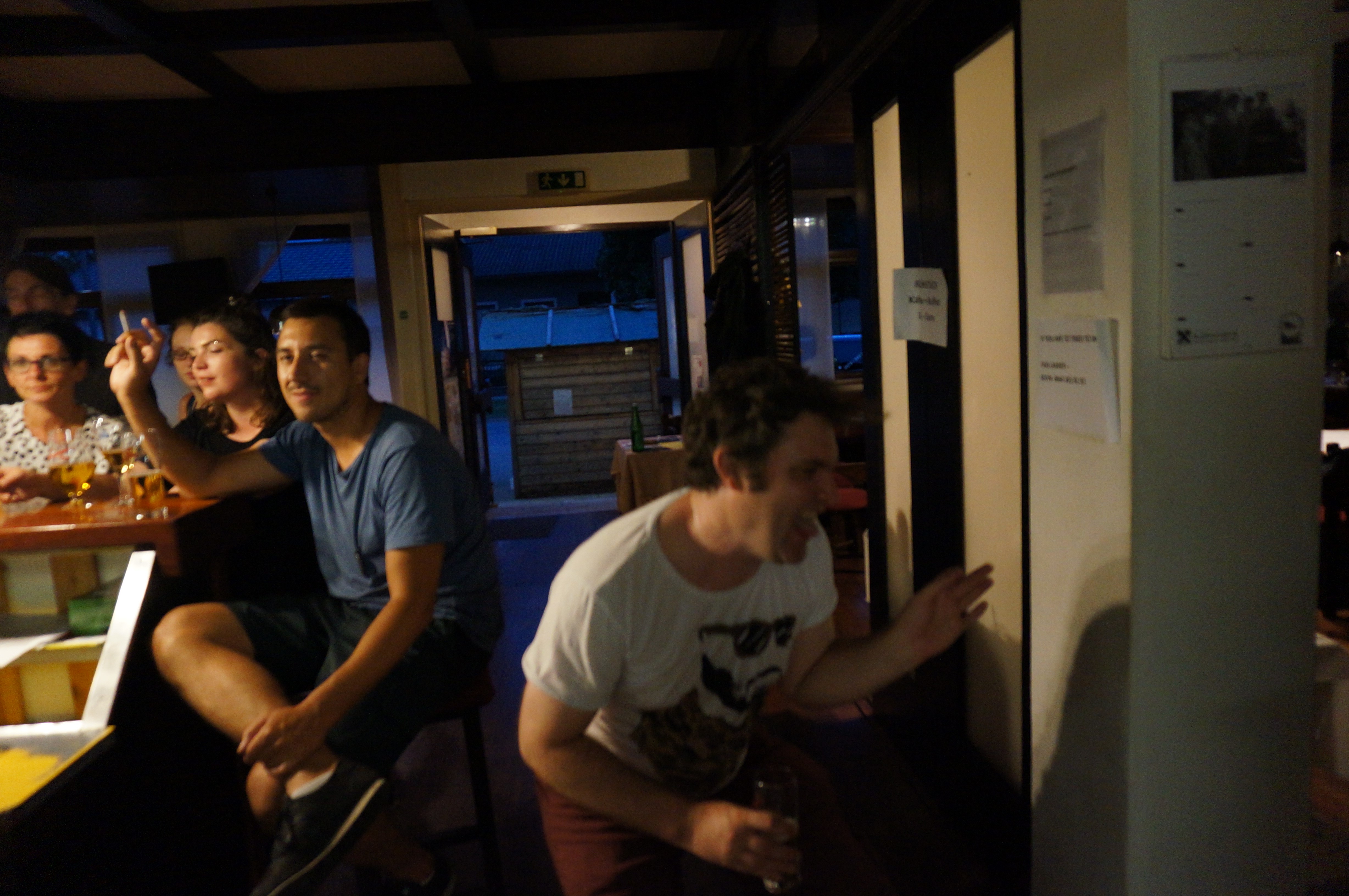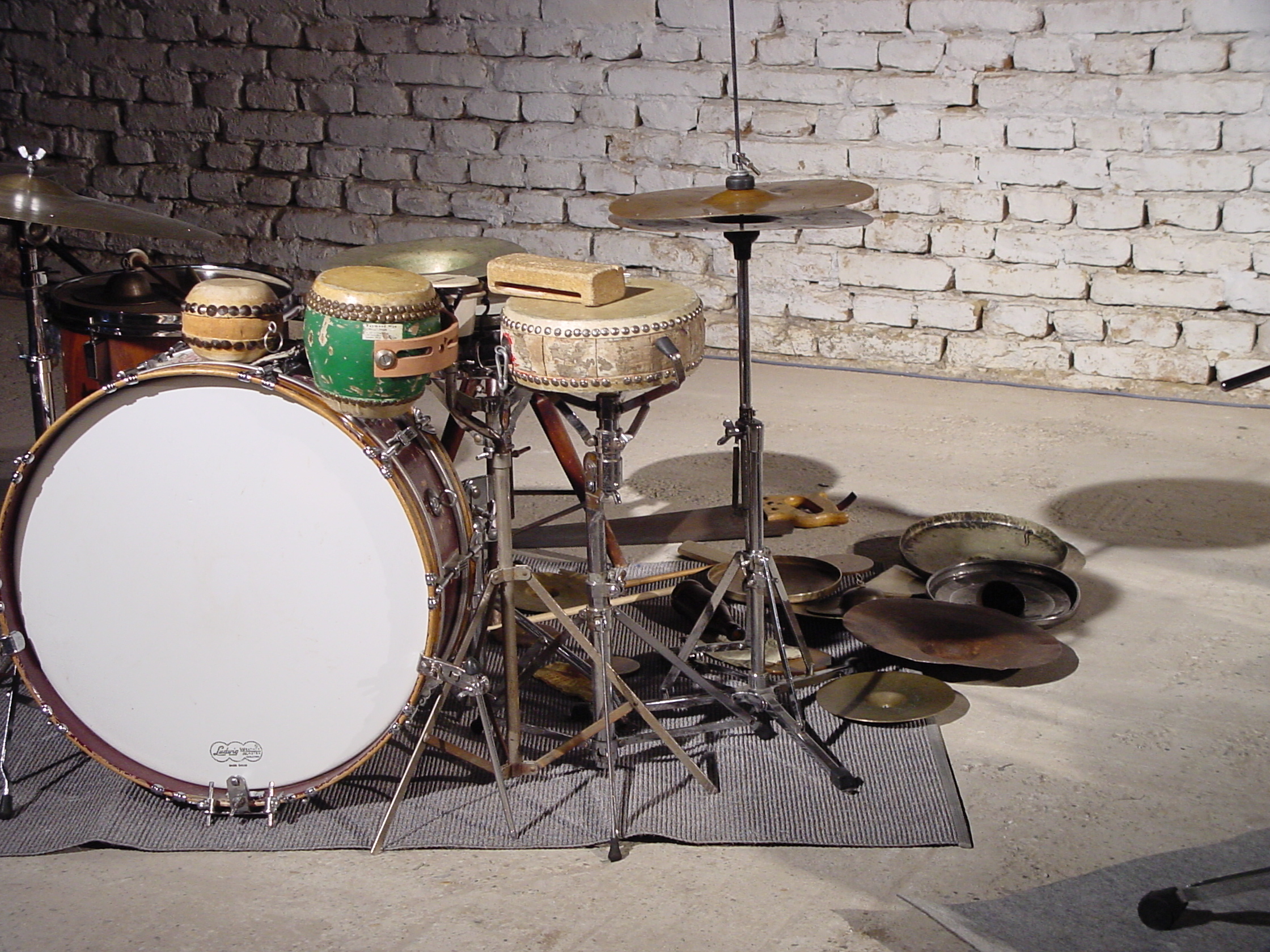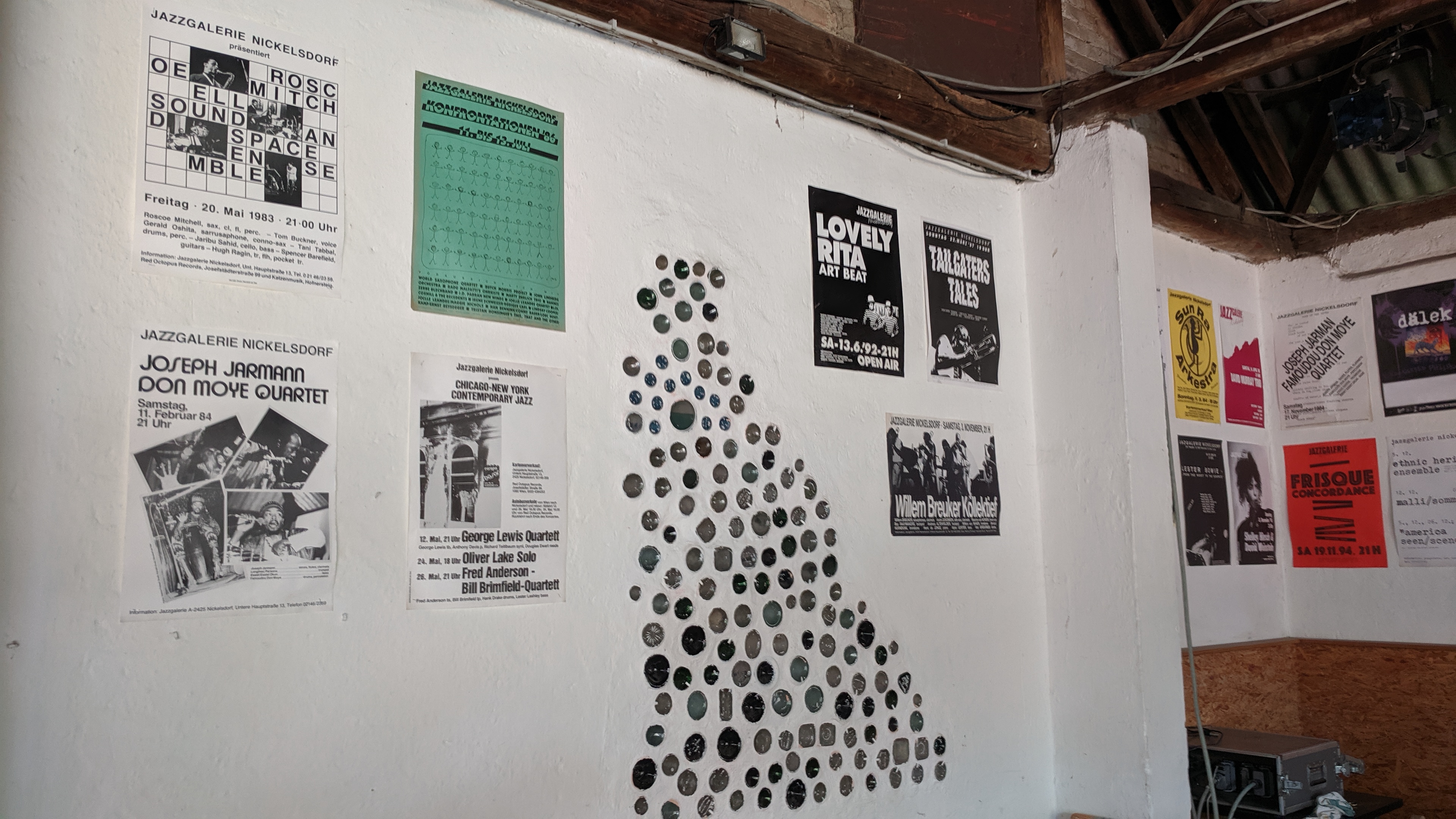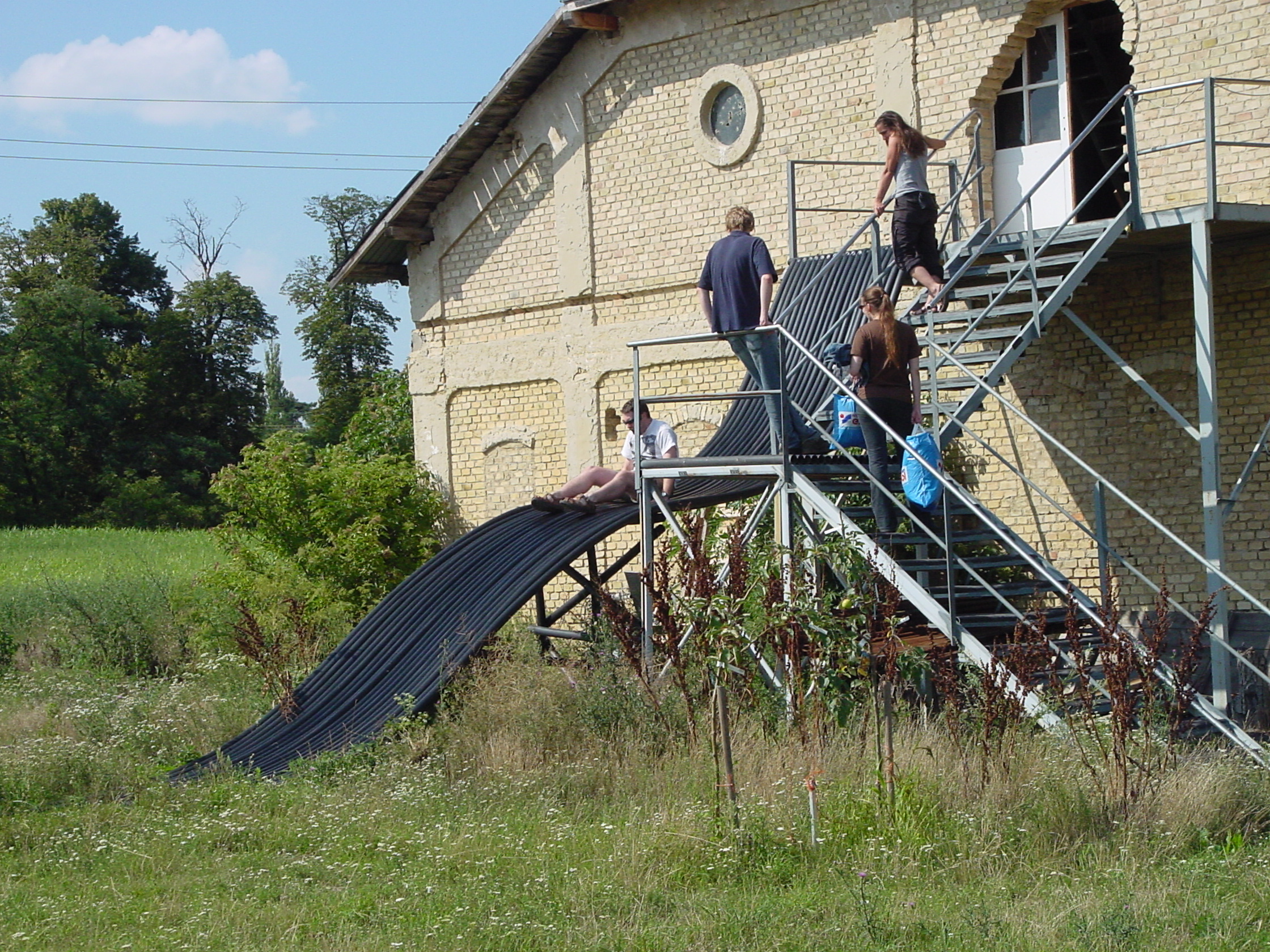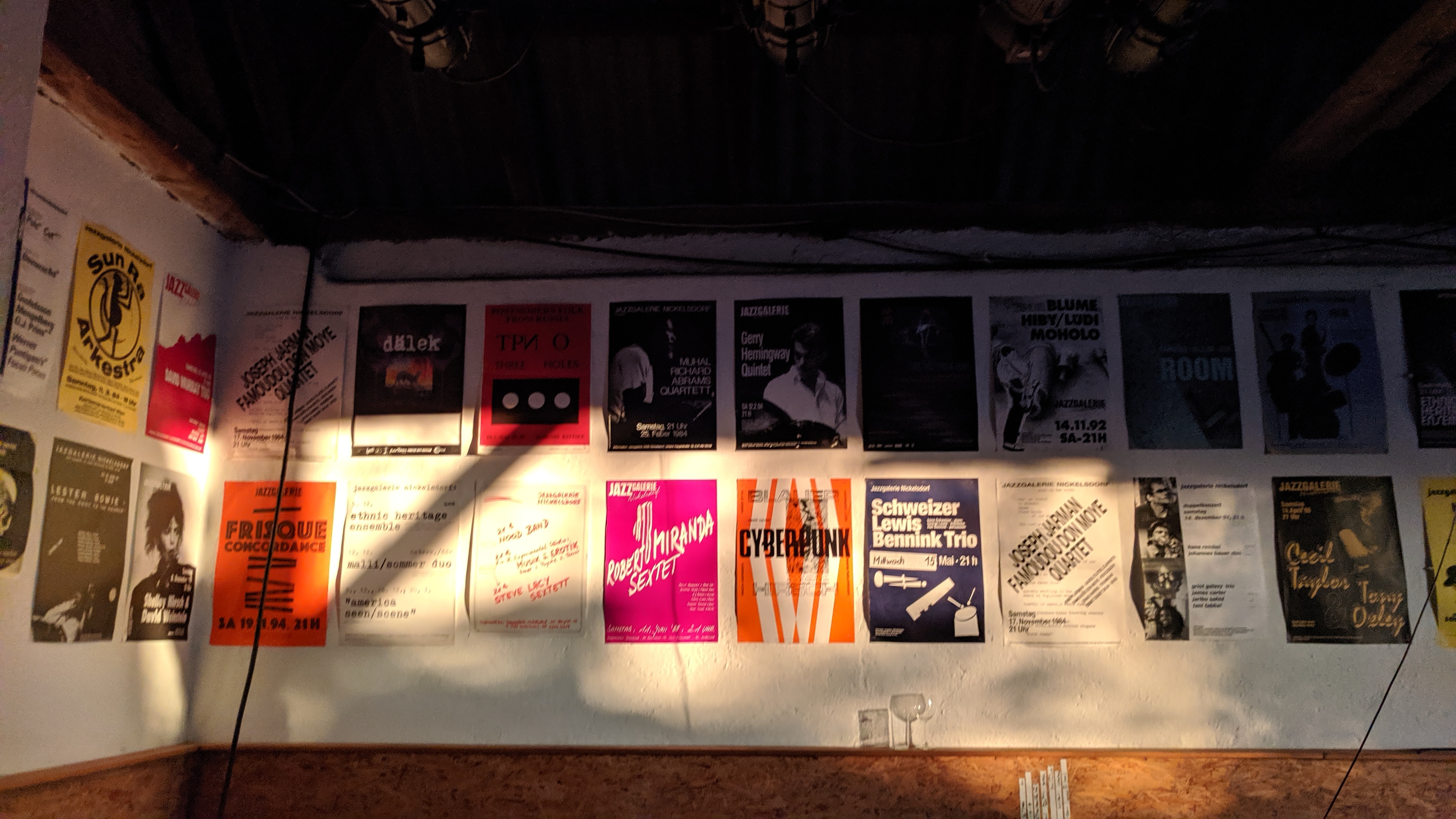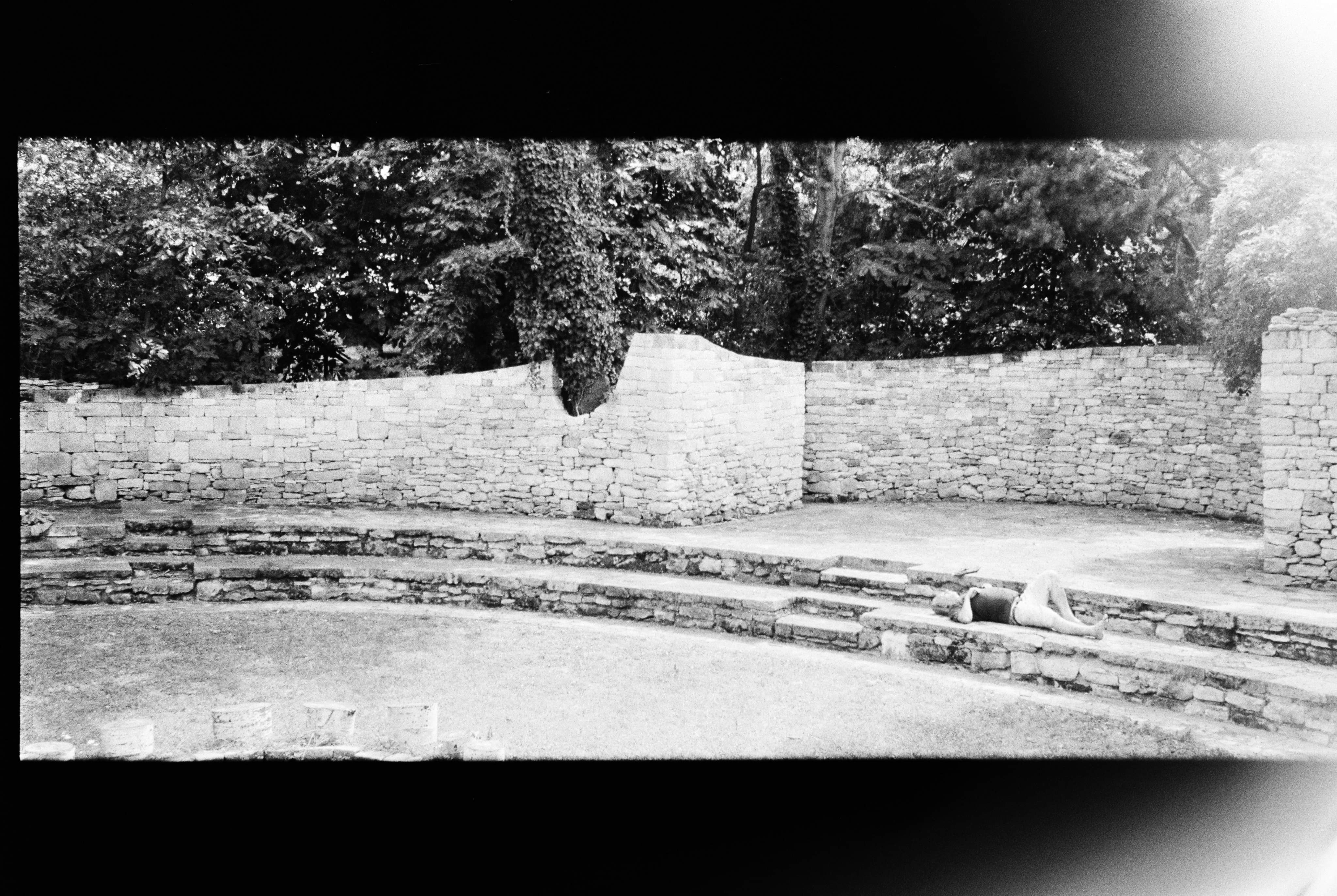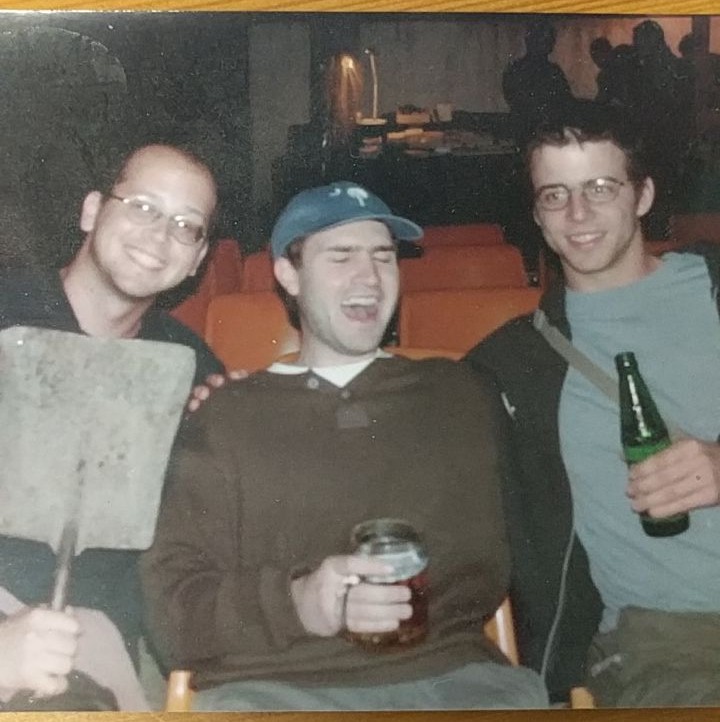by Andrew Choate
it’s so diffuse
being alive
– Amiri Baraka, ”Look for Your Yesterday, Here You Come Today”
.
.
Drink a beer with breakfast.
Have a white-wine spritzer at 15:00. Better yet, a Billie Holiday.
Sit and read and get up only to eat or refresh a drink.
Flirt with a stranger by saying hello.
I don’t want to number my suggestions in the User’s Guide anymore.
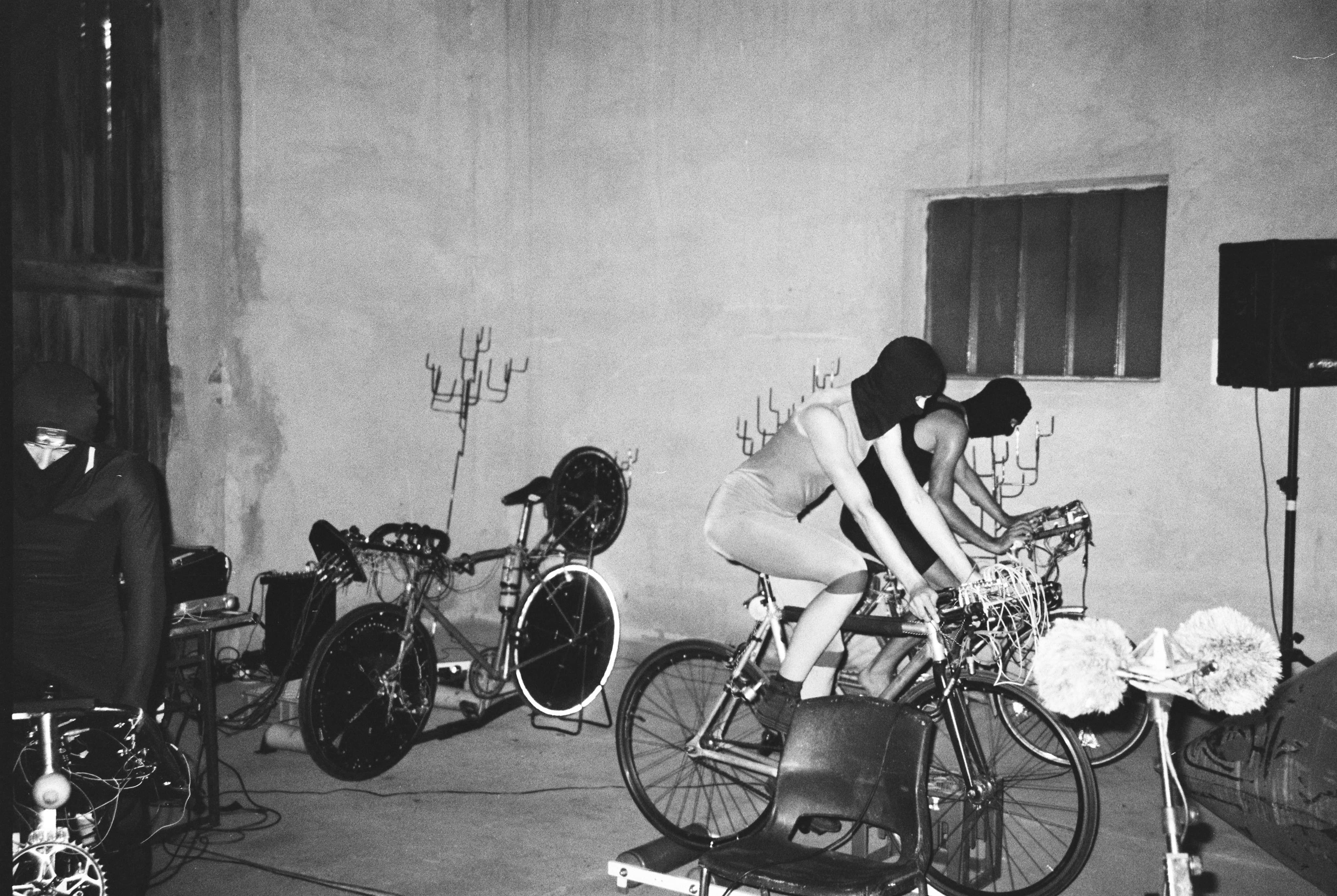
I went hard on the first night. It’s easy to do: so much anticipation, everyone finally together, the weekend becoming every holiday, hope, birthday, and blessing of an entire year wrapped into one short stretch of days. OF COURSE we stayed up too late on the first night!! We miss each other!! And we finally heard, after the year-long wait, the sensuous silence of ecstatic calm that frames the beginnings and ends of music performed in the Jazzgalerie. There’s no silence like that Nickelsdorf silence. The trees even lean closer to the stage.
I have an idea for an album: document all of the silences that occur right before a band begins playing. You’d hear audience shuffling, casual banter, cords shifting and landing on the stage, music stands jostling, but then––you’d feel it––everything settling into place, musicians’ ears perked, invisible eye contact confirmed, thick silence. And then the recording would stop. (Because the actual music would have started.)
I’d like to hear an album of nothing but introductory silences. With credit to the onstage musicians of course, as they are essential to the nature of the silence, and the audience for these silences would want to know what kind of silences they are, and the silence before The Globe Unity Orchestra being of a different fundamental character than the silence before Tiger Trio.
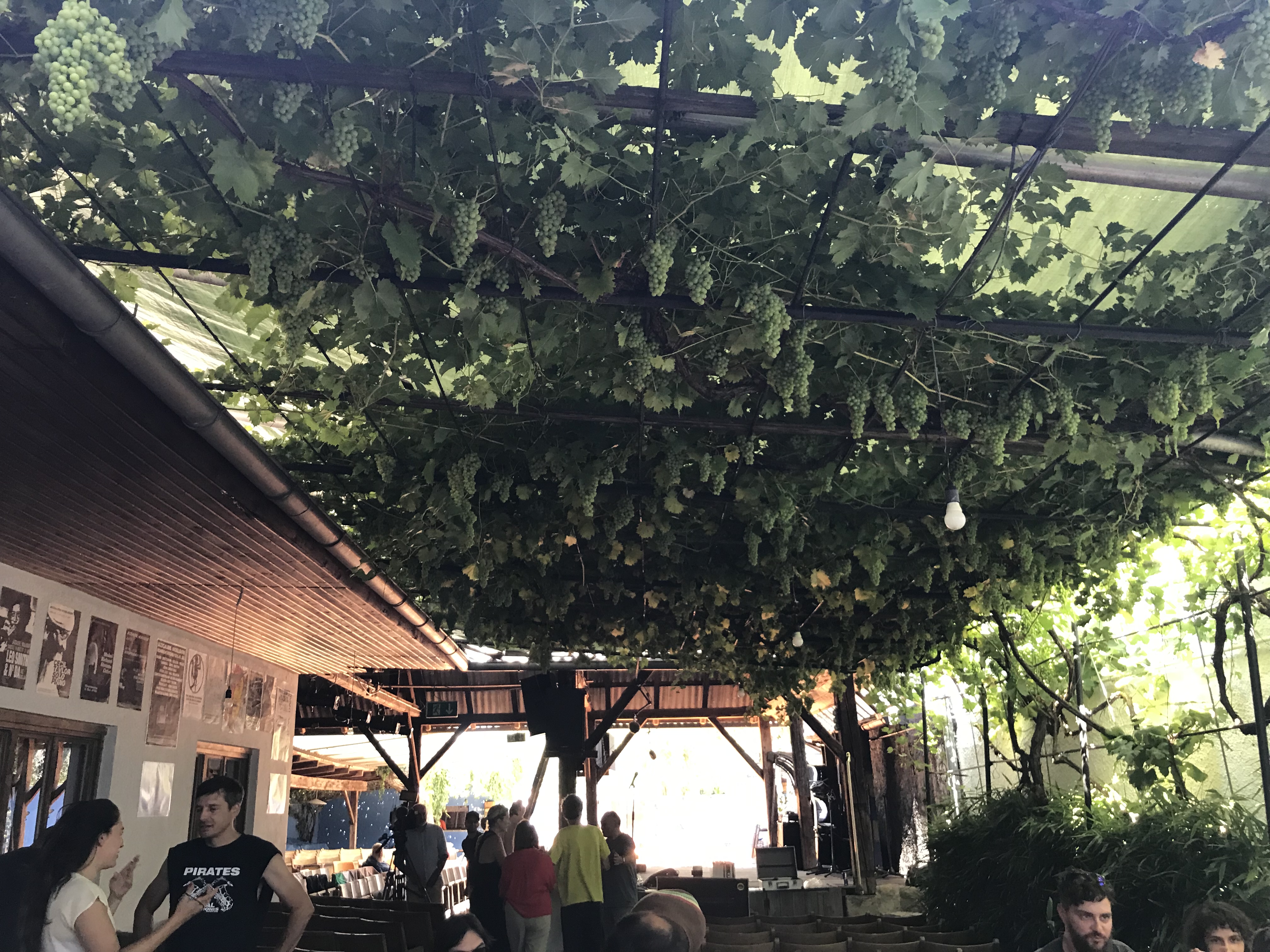
So we were up late last night. Hoot hoot. Might have an early beer with that garlic soup, edge into the delight of a Friday criss-crossed by comrades and cosmic sonics. Or, if there are afternoon concerts at the Kleylehof, wander the garden with a white-wine spritzer. If you’re like me, however, it’s Campari and soda that offers the sensation of waking up to a new day like nothing else. Even if I don’t sip it until 18:00, it’s like an alarm clock ringing “good morning” and “woof-a-doodle-doo!”
It must be grapefruit-breakfast nostalgia: the flavor of Campari triggers dawn down my spine, and back up, zig-zagging a little bit until finally wriggling out of my head through the stereocilia of my inner ear.
Anne Carson, in “Variations on the Right to Remain Silent,” says that Francis Bacon, the painter, “wants to defeat narrative wherever it seeks to arise, which is pretty much everywhere, since humans are creatures who crave a story.” No wonder I like Bacon so much.
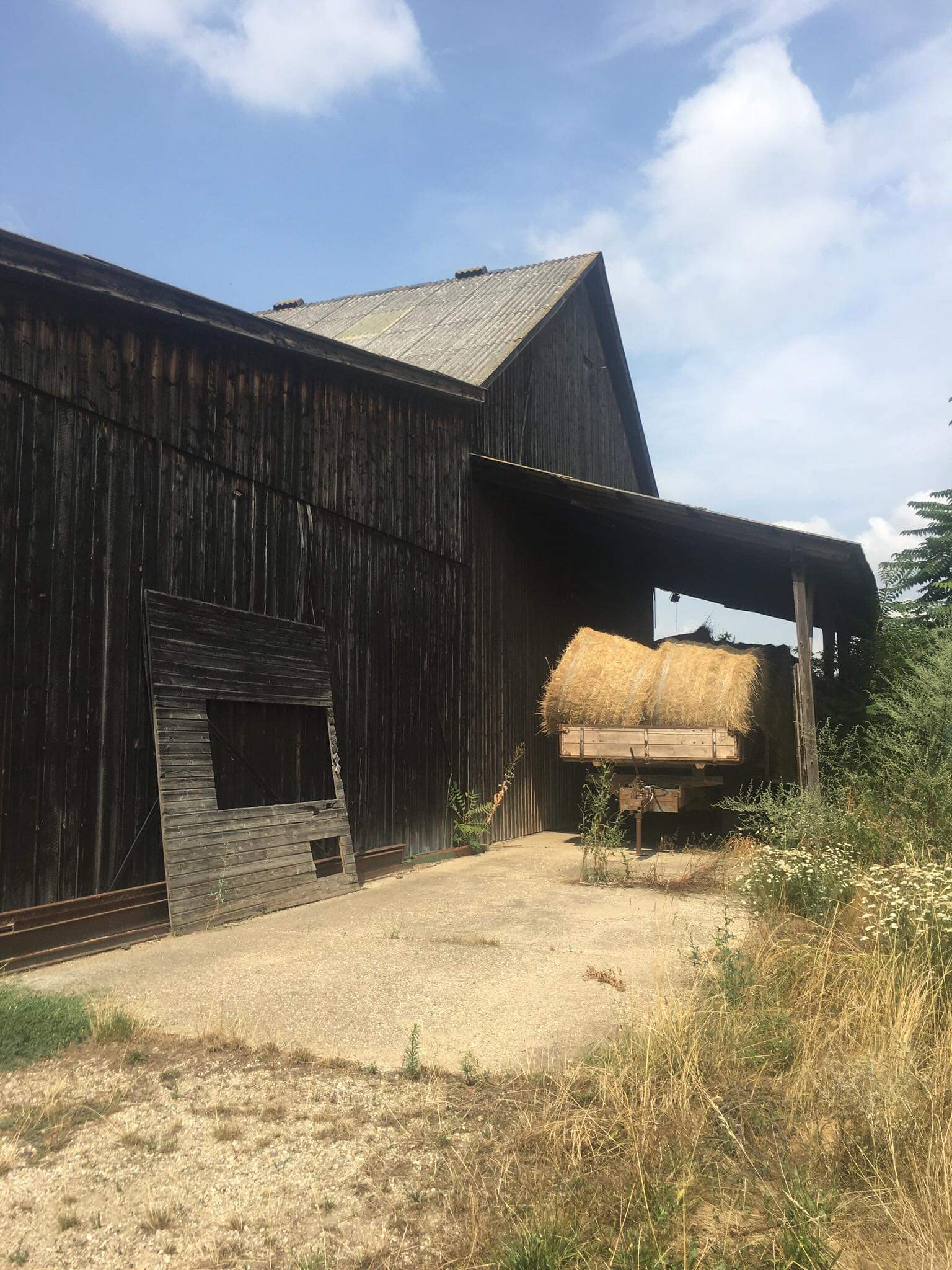
Now back to my origin story in Nickelsdorf. Frank was the first person I knew who attended the Konfrontationen. I vaguely recognized the name of the town from the Spencer Barefield/ Anthony Holland/ Tani Tabbal trio record on Sound Aspects, Live at Nickelsdorf Konfrontationen. Frank had already had a significant impact in co-shaping my musical tastes, along with his roommates Mark and Chris. In the early 90s, we were all discovering jazz together, especially post-bop (and beyond). With no internet, we gathered together at least a couple of times a week to share our recent musical discoveries, each of us in our own personal way trying to follow the line to find the perfect sound. For me, I was seeking one that could encapsulate the emotional chaos of growing up in the South while being fundamentally alienated from its culture. (Even a child recognizes when injustice is rewarded, even if they don’t yet know the level of its institutionalization.)
– Hey! This is an essay about a music festival in Austria! You act like multiple issues are at play here!
– Yeah? Yeah! It’s all connected my wide-eyed wombats! What do you wanna do about it?
Frank attended the Konfrontationen in the summer of 1995, and I heard all about it, in exasperatingly poignant detail, later that year, on a mild December night in South Carolina, over a long listening session at his apartment. He saw so many of my heroes and so many artists that I considered to be the essence of contemporary vitality that I wasn’t even jealous for long: I moved quickly to fascination. Who was behind the festival? How did it work? And where the hell was it again??
Just as swiftly, I shifted to yearning desperation: I had to get there. But how could I pull it off?
.
Anticipate.
Spend time anticipating.
Go somewhere, and anticipate.
Think about what you’re anticipating.
It looks like waiting. It’s not.
The foundation of the Konfrontationen is building blocks of anticipation. You’ve got to figure out how to work with them. The anticipation of the lineup announcement in May each year. The anticipation as you book your travel and coordinate with friends. The anticipation as you journey by foot, taxi, train, plane, bike, and breath. (You know you can’t stop breathing right? That the little exhalations actually propel you forward a little bit in space right? That your breath is actually intergalactic energy-jelly infinitely flattened and recomposed for the sake of chugging you along one poof at a time right?)
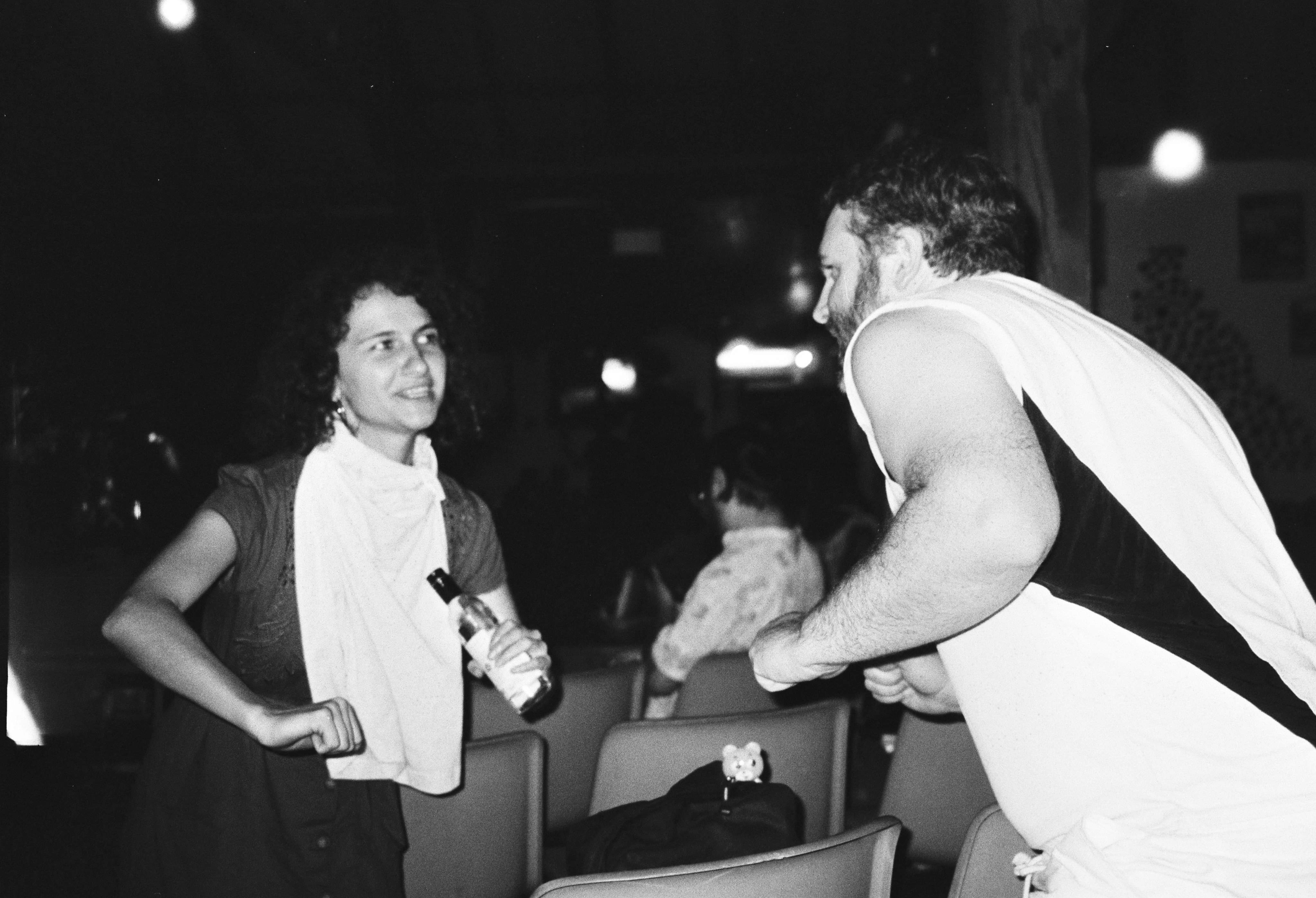
The anticipations build once you arrive, and you hold the schedule in your fingers for the first time. But once you are within the experience of the festival, a delicate tempering operation must be performed, regularly, based on the balancing of two ideas: the calm cohesion of the fluidity of experience and the raging childlike joy at the imminent fulfillment of the highest level of aesthetic pleasures. These pleasures—because the music is improvised—won’t be known, defined, or real until they actualize themselves, afresh, within your body.
I studied Comparative Literature at university, which had intensive language requirements. To get to Nickelsdorf, my plan was to convince the department heads that I needed to take an intensive summer-school class, in France. It worked. However, I discovered that my school only offered immersive summer classes in French through a partner school…in Canada. In Canada!¡?¿ Holy buffalo nostrils beam stickers, that would not work. I talked to family and friends in my hometown and, using an entrée from my high school French teacher, found out about a program I could do through the University of South Carolina that would put me in Tours for two months. I checked the dates: would the third weekend in July be within the dates of study for the program? Yes? I signed up.
My entire reason for enrolling in the program, as you know, was to get to Nickelsdorf. I arrived in Tours on a Sunday night and unpacked. Monday morning, before meeting with teachers or finding groceries, I went to a travel agent to book my ticket. I was going to be on my way, all I had to do was study and milk the time away. Forget carpe diem, I woke up and squeezed the days away.
Over the course of the school program, I befriended two Austrian guys. When I told them about my Nickelsdorf plan, they looked back at me, asked me to repeat the name of the town I was going to, then looked at each other, completely baffled. Then they gave me my first taste of the Red Bull they had imported with them in their suitcase. I had never heard of Red Bull and they had never heard of Nickelsdorf; 1997 was a time of strange ignorance. Actually, the fact they didn’t know where I was talking about shocked me. How could they have never heard of Nickelsdorf? This was the center of the cultural world as far as I was concerned!
.
Listen to music recorded in Nickelsdorf.
It’s uplifting how many live recordings from Nickelsdorf have been released, especially in recent years. Philipp Schmickl put together a list of all (?) the releases for his PhD-project about the Jazzgalerie (see after the text, I put a bunch of these into a playlist on spotify).
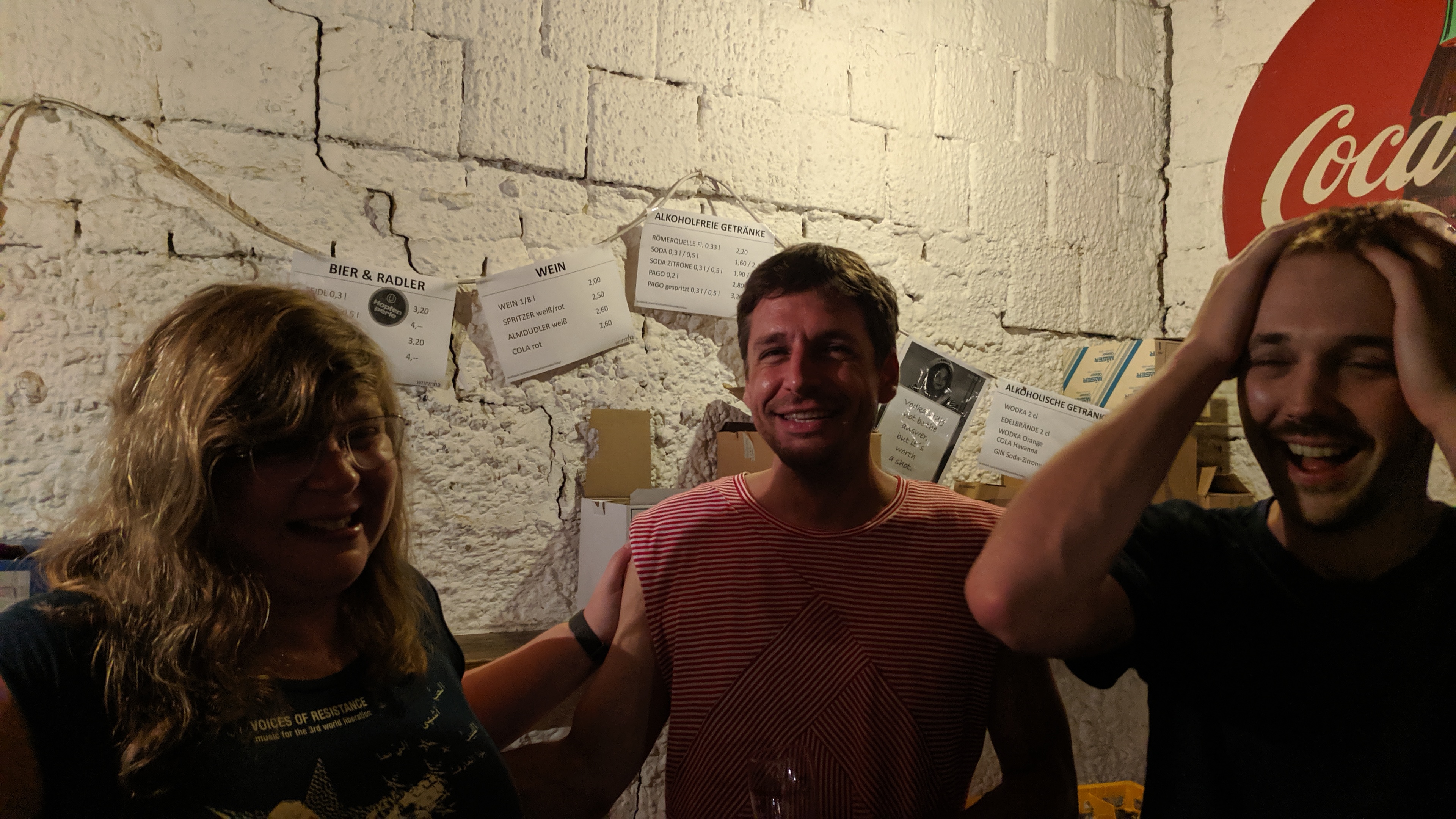
Put the music of Nickelsdorf—not just the memory—right into your ears. I started yesterday by listening to Evan Parker and Matthew Wright’s Trance Map+ band, with Adam Linson, John Coxon, and Ashley Wales. Their Crepescule in Nickelsdorf was recorded only three years ago, and it spun me way round while I sat in the audience, off to the side of the stage, the last lights of the day fading into so many samples, turntables, field recordings, animal sounds, and Parker spiralizations that my entire sense of depth perception was contorted, rewound, and rolled to me like a ball of yarn to a cat. The recording, somehow, exponentially deepens the sense of now-expanding, now-constricting, now-telescoping, now-internalizing multi-dimensionality.
Today I began with “The Importance of Oxidation,” a four minute track that was likely the encore to Barry Guy, Mats Gustafsson, and Raymond Strid’s trio set from their festival appearance in 1995 (Frank was there!). What’s funny about this particular track is that I spent five paragraphs and over 1000 words analyzing this piece of music for my undergraduate thesis in 1998. And yet, somehow, not until I looked at that Discogs page, did I know that it was recorded there! Oh sqully tahmuh. Bink.
Tonight I’ve got my eyes on Das B’s Canopy—the quartet of Tony Buck, Mazen Kerbaj, Mike Majkowski, and Magda Mayas—and MIMEO’s Music in Movement Electronic Orchestra debut, but, the way things have been going during this writing, I might get sidetracked following the rhythms of the Idris Ackamoor Paris Quartet’s album The Periphery of the Periphery. It’s an aptly named album considering the multiple edges and tangents that embrace, connect, become wings, and flap together, flying off in new patterns of motion from Café Restaurant Falb.
I could sure use a schnitzel, a schnapps, and a prost with the Wurmbar right now. “West Coast!”
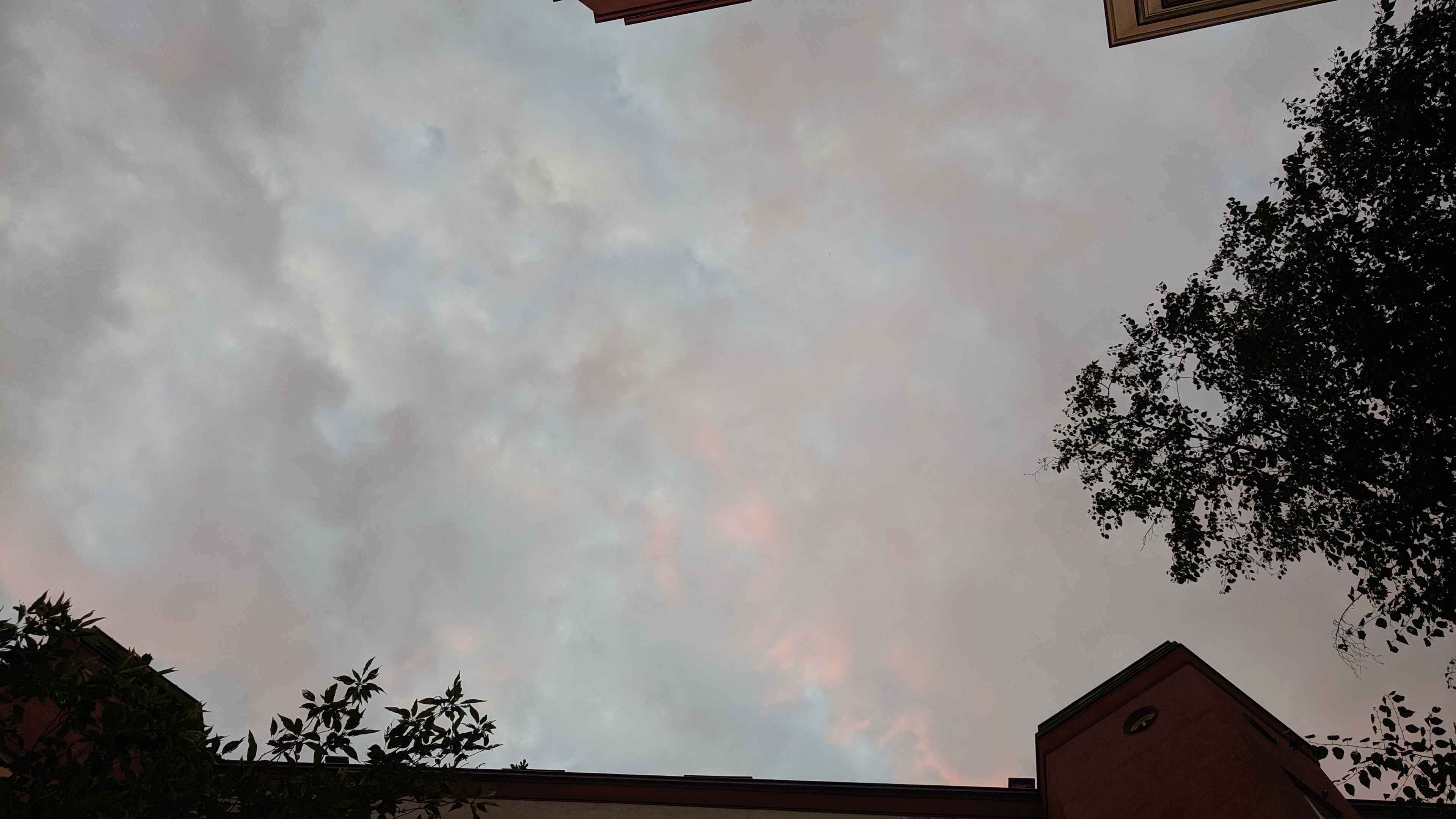
[I’ll continue this journey with you tomorrow my compatriots. It hurts, but it’s the right kind of pain. “The real terror of nature is humanity enraged, the true technicolor spectacle hollywood cant record. They cant even show you how you look when you go to work, or when you come back. They cant even show you thinking or demanding the new socialist reality, it’s the ultimate tidal wave. When all over the planet, men and women, with heat in their hands, demand that society be planned to include the lives and self determination of all the people ever to live. That is the scalding scenario with a cast of just under two billion that they dare not even whisper,” as Baraka wrote in “A New Reality Is Better Than a New Movie!”]
thursday
Paul Lovens’ comment
saturday
sunday
.
Official releases (partly) recorded at the Jazzgalerie Nickelsdorf:
1983
Lindberg, John (1983). The East Side Suite. LP. Germany: Sound Aspects Records – sas 001 (recorded live July 8, 1983) https://www.discogs.com/John-Lindberg-The-East-Side-Suite/release/2414507
1984
Maslak, Keshavan with Charles Moffett (1984). Blaster Master. LP. Italy: Black Saint – BSR 0079 (recorded live August 16, 1981) https://www.discogs.com/Keshavan-Maslak-With-Charles-Moffett-Blaster-Master/release/2349123
1985
Griot Galaxy (1985). Opus Krampus. LP. Germany: Sound Aspects Records – sas 004 (recorded live July 1, 1984) https://www.discogs.com/Griot-Galaxy-Opus-Krampus/release/1002169
1986
Barfield, Spencer, Anthony Holland and Tani Tabbal (1986). Live At Nickelsdorf Konfrontationen. LP. Germany: Sound Aspects Records – sas 007 (recorded live June 29, 1984) https://www.discogs.com/Spencer-Barefield-Anthony-Holland-Tani-Tabbal-Live-At-Nickelsdorf-Konfrontationen/release/1912653
Ganelin Trio (1986). Ttaango … In Nickelsdorf. LP. UK: Leo Records – LR 400/401 (recorded live October 19, 1985) https://www.discogs.com/Ganelin-Trio-Ttaango–In-Nickelsdorf/release/958368
1992
Qui.t (1992). Comprovisations I-X. CD. Austria: Extraplatte – Ex 166 (recorded live July 22, 1991) https://www.discogs.com/Quit-Comprovisations-I-X/release/3799384
1995
Snakkerdu Densk (1995). NEM. CD. Austria: Trost Records – TR 060 (recorded live December 3, 1994) https://www.discogs.com/es/Snakkerdu-Densk-NEM/release/1308572
1996
Guy, Barry, Mats Gustafsson, Raymond Strid (1996). You Forget To Answer. CD. Ireland: Maya Recordings – MCD 9601 (recorded live July 24, 1995; most likely July 21) https://www.discogs.com/Guy-Gustafsson-Strid-You-Forget-To-Answer/release/2276140
1997
Various (1997). Jazzgalerie Nickelsdorf. The 20th Anniversary Album. CD. Nickelsdorf: self-published https://www.discogs.com/Various-Jazzgalerie-Nickelsdorf-The-20th-Anniversary-Album/release/2390284
The Joel Futtermann – Kidd Jordan Quintett (1997). Nickelsdorf Konfrontationen. CD. USA: Silkheart – SHCD 143 (recorded live July 24, 1995; most likely July 22) https://www.discogs.com/The-Joel-Futterman-Kidd-Jordan-Quintet-Nickelsdorf-Konfrontation/release/2305429
1998
Frank Gratkowski Trio (1998). The Fume Factor. CD. Germany: Random Acoustics – RA 020 (recorded live February 1, 1997) https://www.discogs.com/Frank-Gratkowski-Trio-The-Flume-Factor/release/1286476
MIMEO (1998). Queue. CDr. Germany: GROB – GROB 005 (recorded live July 20, 1997) https://www.discogs.com/MIMEO-Queue/release/894132
1999
Max Nagl Trio (1999). Falarm. CD. Austria: Rude Noises – 009 CD (recorded live ???) https://www.discogs.com/Max-Nagl-Trio-Falarm/release/8967652
Polwechsel (1999). Polwechsel 2. CD. Switzerland: hat[now]ART – hat[now]ART 119 (recorded live ?? July, 1998) https://www.discogs.com/Polwechsel-Polwechsel-2/release/1162740
2001
Millions, Kenny, Charles Moffett (2001). Brother Charles. CDr. USA: Hum Ha Records – #17 (recorded live August 16, 1981) https://www.discogs.com/de/Kenny-Millions-Charles-Moffett-Brother-Charles/release/3330613
Németh, Feri with Marc Whitcage Trio (2001). Common Ground. CD. Hungary: Harmónia Produkció – HCD 171 (recorded live May 4, 2001) https://www.discogs.com/Feri-N%C3%A9meth-With-Mark-Whitecage-Trio-Common-Ground/release/3223487
2002
Dieb13/Pure/Siewert (2002). Just In Case You Are Bored. So Are We. CD. Austria: dOc recordings – dOc 004 (recorded live January 13, 2001) https://www.discogs.com/Dieb13-Pure-Siewert-Just-In-Case-You-Are-Bored-So-Are-We/release/870274
2003
Farmers Manual (2003). Rla. DVD. Austria: Mego – MEGO 777 (recorded live July 16, 1999) https://www.discogs.com/de/Farmers-Manual-Rla/release/130660
2004
E-Rax (2004). Antics. DVD. Netherlands: Institute For Improvisation – INFIM. 001 (recorded live November 30, 2002) https://www.discogs.com/de/E-Rax-Antics/release/1268036
2009
Brötzmann, Peter (2009). Lost & Found. CD. Germany: FMP –FMP 134 (recorded live July 14, 2006) https://www.discogs.com/Br%C3%B6tzmann-Solo-Lost-Found/release/2233767
AUS (2009). Live In Nickelsdorf. CD. Germany: Jazzwerkstatt – jw051 (recorded live July 14, 2007) https://www.discogs.com/Aus-Live-In-Nickelsdorf/release/2033765
2013
Filip, Klaus & Dafne Vincente-Sandoval (2013). Remoto. CD. France: Potlatch – P213 (recorded live December 8, 2013, evangelische Kirche) https://www.discogs.com/de/Klaus-Filip-Dafne-Vicente-Sandoval-Remoto/release/4986787
2014
“A” Trio (2014). Live In Nickelsdorf. LP. USA: Roaratorio – roar32 (recorded live July 21, 2012) https://www.discogs.com/A-Trio-Live-In-Nickelsdorf/release/5356081
Allen, Marshall, Juini Booth, Philipp Quehenberger, Didi Kern (2014). Sunset/Sunrise. Vynil 7″. Austria: qed Sounds – qed4 (recorded live June 2, 2012) https://www.discogs.com/de/Marshall-Allen-Juini-Booth-Philipp-Quehenberger-Didi-Kern-SunsetSunrise/release/5766110
Idris Ackamoor Paris Quartet (2014). The Periphery Of The Periphery. LP. Italy: Sagittarius A-Star – SAS #44 (recorded live October 6, 2001) https://www.discogs.com/Idris-Ackamoor-Paris-Quartet-The-Periphery-Of-The-Periphery/release/5351892
Kazuisha Uchihashi/Noid/Tamara Wilhelm (2014). I Hope It Doesn’t Work. CD. Russia: Mikroton Recordings – mikroton cd 28 (recorded live July 21, 2013) https://www.discogs.com/Kazuhisa-Uchihashi-Noid-Tamara-Wilhelm-I-Hope-It-Doesnt-Work/release/5707372
2015
The Sun Ra Arkestra (2015). Live In Nickelsdorf 1984. LP. Austria: Trost Records – TR 118 (recorded live March 11, 1984) https://www.discogs.com/The-Sun-Ra-Arkestra-Live-In-Nickelsdorf-1984/release/6422671
Foussat, Jean-Marc & Les Autres (2015). Alternative Oblique. CD. France: Improvising Beings – ib38 (recorded live May 16, 2015, Kleylehof) https://www.discogs.com/de/Jean-Marc-Foussat-Les-Autres-Alternative-Oblique/release/7285985
2017
Trio Now! (2017). Live At Nickelsdorfer Konfrontationen 23.07.2016. CD. UK: Leo Records – CD LR 789 (recorded live July 23, 2016) https://www.discogs.com/Trio-Now-Live-At-Nickelsdorfer-Konfrontationen-23072016/release/10493432
The Elks (2017). Bat English. MC. Germany: Not On Label (The Elks 3) Self-released) (recorded live July 21, 2016) https://www.discogs.com/de/The-Elks-Bat-English/release/10917015
2018
Agnel, Sophie, John Edwards, Steve Noble (2018). Aqisseq. CD. France: ONJ RECORDS – JF010 (recorded live July 22, 2016) https://www.discogs.com/Sophie-Agnel-John-Edwards-Steve-Noble-Aqisseq/release/12925470
Baars/Kneer/Elgart (2018). Live At Konfrontationen Nickelsdorf 2012. CD. Netherlands: Evil Rabbit Records – ERR 22 (recorded live July 22, 2012) https://www.discogs.com/Baars-Kneer-Elgart-Live-At-Konfrontationen-Nickelsdorf-2012/release/11798731
The Clifford Thornton Memorial Quartet (2018). Sweet Oranges. CD. Poland: Not Two Records – MW971-2 (recorded live July 20, 2017) https://www.discogs.com/The-Clifford-Thornton-Memorial-Quartet-Sweet-Oranges/release/11856373
2019
Das B (2019). Canopy. CD. Russia: топот – T408T (recorded live July 22, 2017) https://www.discogs.com/Das-B-Canopy/release/14329045
Parker, Evan, Matthew Wright, Adam Linson, John Coxon, Ashley Wales, Trance Map+ (2019). Crepuscule In Nickelsdorf. CD. Switzerland: Intakt Records – Intakt CD 329 (recorded live July 22, 2017) https://www.discogs.com/Evan-Parker-Matthew-Wright-5-Adam-Linson-John-Coxon-Ashley-Wales-Trance-Map-Crepuscule-In-Nickelsdor/release/13916186
Speak Easy (2019). @ Konfrontationen. CDr. UK: Confront – ccs 99 (recorded live July 22, 2016) https://www.discogs.com/Speak-Easy–Konfrontationen/release/13777035
2020
Athanor (2020). Live In Nickelsdorf 1978. CD. Austria: Black-Monk – BMCD-03 (recorded live April 22, 1978) https://www.discogs.com/Athanor-Live-in-Nickelsdorf-1978/release/14771196
Kaufmann, Achim, Michael Moore, Dylan Van Der Schyff (2020). Bouche Perdue. File. Canada: WhirrbooM! Records – none (recorded live March 27, 2004) https://www.discogs.com/Achim-Kaufmann-Michael-Moore-4-Dylan-Van-Der-Schyff-Bouche-Perdue-/release/14903287
